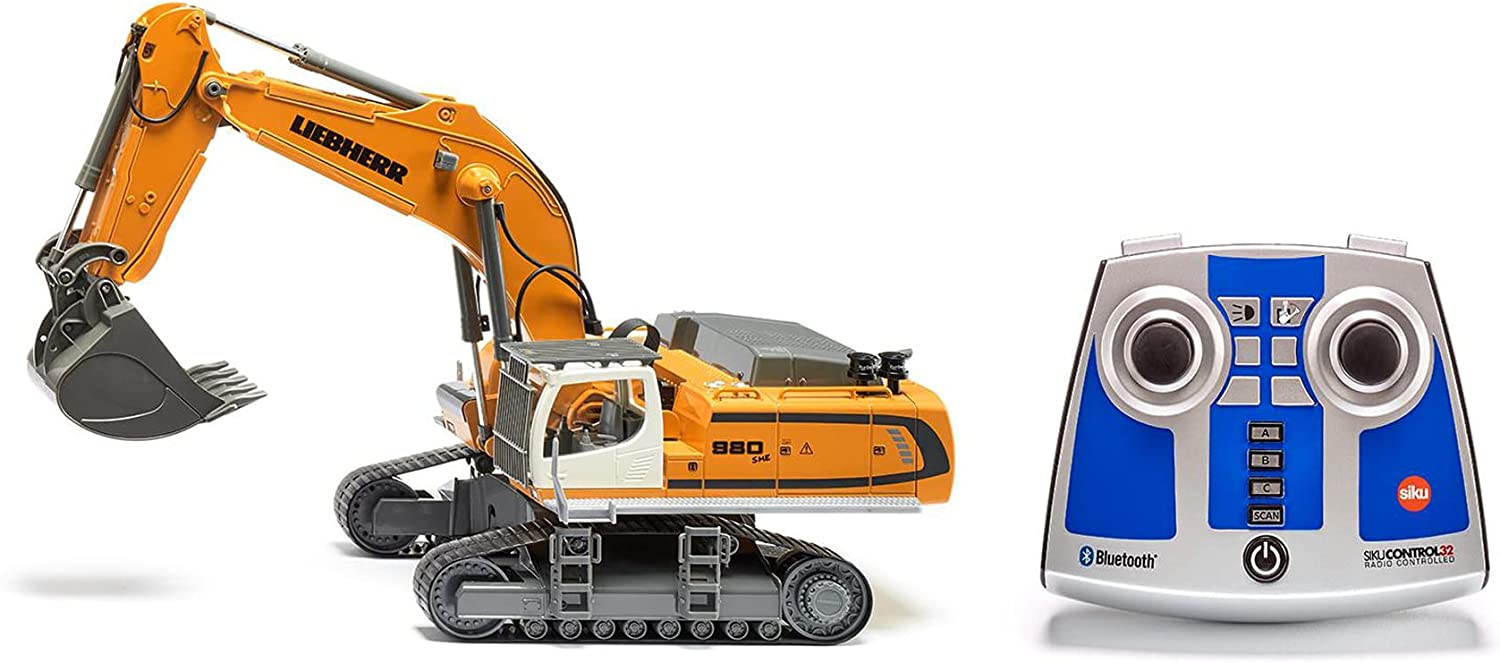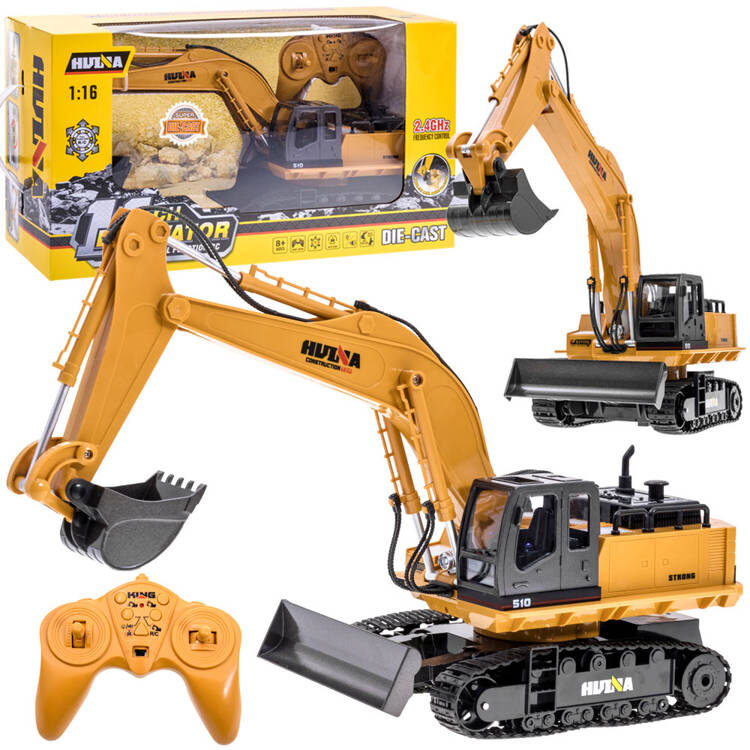Why the Double E Volvo rc excavator Is a Game-Changer for Efficiency and Safety
Recognizing How Excavator Works and Its Effect On Performance
Excavators play a necessary role in building and mining procedures, depending on a complicated interaction of hydraulic and mechanical systems. Their ability to do a variety of tasks depends upon both their design and the modern technology integrated within. Recognizing these parts can greatly affect operational performance and efficiency. As innovations remain to improve the industry, one should take into consideration exactly how these modifications will certainly affect future practices and performance.
The Essentials of Excavator Mechanics

The Role of Hydraulic Solutions in Excavators
At the heart of excavator operation lies the hydraulic system, which plays a crucial role in powering the machine's features and activities. This system uses pressurized hydraulic fluid to move energy, allowing different activities such as training, moving, and digging. By utilizing the principles of hydraulics, excavators can do jobs with impressive precision and pressure, improving general operational efficiency.The hydraulic system is composed of key parts, consisting of pumps, shutoffs, and cyndrical tubes, which function with each other to control the circulation and direction of the liquid. When the operator involves the controls, the hydraulic fluid is guided to specific cylinders, equating the driver's commands into physical activity. This system permits smooth and receptive actions, which are crucial in building and construction and excavation environments. double e volvo rc excavator. The effectiveness of the hydraulic system straight impacts the performance and versatility of the excavator, making it a crucial component in contemporary excavation procedures
Key Components of an Excavator
Understanding the essential parts of an excavator is vital for comprehending exactly how this effective maker operates. An excavator contains a number of substantial aspects, consisting of the undercarriage, home, boom, arm, and container. The undercarriage provides security and movement, frequently including tracks or wheels to browse numerous surfaces. Your home has the engine and hydraulic systems, enabling the operator to regulate movement and power the equipment. The boom extends from the residence, making it possible for vertical reach, while the arm attaches to the container, helping with excavating and lifting operations.Additionally, the taxi houses the operator, outfitted with controls for exact maneuvering. Each of these elements plays an essential duty in the excavator's overall performance, adding to its effectiveness and performance on building websites. Understanding these components helps in preserving and optimizing excavator performance, guaranteeing tasks are completed safely and properly.
Attachment Versatility and Its Benefits
Accessory convenience is a crucial facet of excavators, enabling operators to switch over in between various tools tailored for details tasks. This flexibility not only enhances task effectiveness however likewise adds to cost-effectiveness by reducing the need for multiple machines. Understanding the different sorts of attachments available can significantly affect the general efficiency and capability of an excavator on work websites.
Kinds of Attachments
While excavators are primarily recognized for their digging capacities, their real convenience depends on the wide variety of attachments offered. These accessories enhance the excavator's capability, enabling it to perform various tasks beyond excavation. Common attachments include pails (for excavating and scooping), hydraulic thumbs (for realizing materials), and augers (for drilling openings) Grapples are used for relocating and dealing with particles, while rippers can separate difficult surface areas. Various other specialized attachments, such as plates and plows, enable excavators to adapt to details work requirements. This variety not just boosts the device's energy across various industries, consisting of landscape design, demolition, and building and construction, but additionally allows drivers to tailor their equipment to satisfy certain task demands successfully.
Enhanced Work Efficiency
Making the most of work effectiveness is a key advantage of using numerous excavator attachments. Different add-ons allow an excavator to do multiple jobs without requiring to change tools, saving beneficial time and labor. As an example, using a hydraulic hammer can damage concrete while a pail attachment can excavate dirt, enabling a seamless process. This adaptability reduces downtime connected with tools changes and improves performance on-site. Additionally, specialized accessories boost precision in tasks such as grading or landscape design, bring about higher top quality end results. The capacity to adjust to numerous work requirements not just improves operations yet additionally minimizes the need for extra machinery, making certain that tasks are completed swiftly and effectively. On the whole, accessory adaptability substantially contributes to increased task effectiveness in excavation job.
Cost-Effectiveness and Convenience
Cost-effectiveness is a significant advantage of using flexible excavator attachments. These attachments permit a single excavator to carry out numerous jobs, reducing the need for additional equipment and labor - double e volvo rc excavator. By switching over between containers, hammers, and grapples, operators can tackle various projects, from excavating to demolition, therefore optimizing equipment utilization. This flexibility not only lowers functional expenses but likewise reduces downtime connected with altering equipment. Additionally, the capacity to personalize excavators with specialized attachments boosts performance, as they can successfully deal with diverse jobs according to project needs. In conclusion, the mix of cost-effectiveness and convenience in excavator accessories adds to enhanced operational effectiveness and resource allocation in building and construction and excavation jobs

Advanced Innovation in Modern Excavators
Modern excavators are progressively geared up with advanced modern technology that changes excavation procedures. Automation improves operations, while boosted gas effectiveness decreases operational costs. In addition, wise control systems enhance precision and safety and security, noting a significant advancement in excavation devices.
Automation in Excavation Processes
As excavation technology advances, automation has actually emerged as a crucial part in improving efficiency and accuracy on job websites. Modern excavators are geared up with innovative automated systems that assist in tasks such as grading, excavating, and trenching with marginal operator intervention. These systems utilize sensors, GPS, and artificial intelligence algorithms to guarantee precise placing and depth control, greatly minimizing the margin for error. Furthermore, automation allows operators to concentrate on tactical decision-making instead of manual controls, causing improved efficiency on the whole. Such advancements not only enhance process yet additionally enhance security by minimizing human error in intricate operations. As a result, the assimilation of automation in excavation processes represents Go Here a significant innovation in construction innovation, driving the market in the direction of greater efficiency and efficiency.
Improved Fuel Effectiveness
Innovations in modern technology have actually additionally led to significant improvements in fuel efficiency for contemporary excavators. Modern machines are geared up with innovative engines that enhance power outcome while decreasing fuel consumption. These engines utilize innovative combustion technologies, such as turbocharging and straight fuel injection, to enhance efficiency and performance. In addition, light-weight materials in building minimize general weight, permitting much less energy expenditure throughout procedure. The introduction of variable speed controls enables drivers to change engine efficiency according to particular tasks, better decreasing gas use. Because of this, these improvements not only lower operational expenses however also contribute to ecological sustainability by reducing emissions. On the whole, improved fuel performance in excavators is an essential growth that boosts efficiency and financial stability in the building and construction sector.
Smart Control Solution
While drivers browse increasingly intricate task websites, wise control systems in excavators have actually become important devices for improving efficiency and accuracy. These advanced innovations utilize sensing units and algorithms to keep track of numerous parameters such as tons weight, terrain conditions, and functional performance. By instantly adjusting hydraulic features, clever systems enhance equipment efficiency, causing improved efficiency and lowered wear on components. In addition, operators take advantage of instinctive interfaces that supply real-time responses and diagnostics, permitting informed decision-making. This integration of technology not only simplifies operations but likewise decreases human error, contributing to safer workplace. As the building and construction industry remains to progress, clever control systems will certainly play a vital function in forming the future of excavator effectiveness and effectiveness.
Enhancing Operational Performance With Excavators
Excavators play an essential function in improving operational efficiency across different building and construction and excavation tasks. Their versatility enables multiple tasks, consisting of product, training, and excavating handling, which simplifies operations and lowers the demand for added tools. With effective hydraulic systems, excavators can do sturdy jobs with accuracy, substantially lowering the moment needed to complete tasks. The combination of innovative technology, such as GPS and automated controls, better maximizes their procedure, allowing operators to accomplish greater precision and minimize material waste. Additionally, modern excavators are made to take in less fuel and decrease discharges, adding to both cost financial savings and ecological sustainability. By using excavators efficiently, construction groups can improve efficiency, meet task due dates, and improve total website administration. This multifunctionality and effectiveness make excavators vital tools in the modern-day building landscape.
The Future of Excavators in Construction and Mining Industries
As the building and construction and mining industries advance, the future of excavators is poised for significant improvement driven by technological technology and altering operational needs. Advancements in automation and man-made intelligence are reshaping excavator capabilities, enabling improved precision and performance in operations. Independent excavators are emerging, lowering the need for human intervention and decreasing the risk of accidents.Moreover, the integration of telematics and IoT modern technology allows real-time surveillance of equipment efficiency and predictive upkeep, enhancing uptime. Green layouts, consisting of hybrid and electrical designs, are gaining traction, aligning with sustainability goals within the industry.Additionally, making use of advanced materials and lighter styles enhances gas efficiency while preserving efficiency standards. As these patterns progression, excavators will play a crucial duty in meeting the increasing demands for performance and safety and security in construction and mining, inevitably transforming functional landscapes.
Regularly Asked Inquiries
Exactly How Do Weather Condition Conditions Affect Excavator Performance?

Climate condition substantially affect excavator performance, as rainfall and mud can hinder traction and security, while severe temperatures might influence hydraulic systems. Operators other needs to adapt to these see this site variables to guarantee perfect functionality and safety and security throughout operations.
What Safety Actions Should Operators Adhere To While Utilizing Excavators?
Safety measures for excavator drivers include putting on suitable individual protective tools, carrying out pre-operation inspections, making certain proper interaction with ground employees, keeping a safe range from overhead threats, and adhering to well-known operational methods to avoid mishaps.
Just How Usually Should Excavators Be Maintained for Ideal Efficiency?
Excavators ought to be kept frequently to assure peak performance, commonly every 250 operating hours or as specified by the maker. Regular checks improve integrity, avoid unanticipated break downs, and expand the lifespan of the devices.
What Is the Average Life Expectancy of an Excavator?
The ordinary lifespan of an excavator usually varies from 10,000 to 15,000 hours of procedure. Factors influencing durability consist of upkeep techniques, operating conditions, and the top quality of the maker itself, influencing overall productivity and efficiency.

Can Excavators Operate Irregular Terrain Efficiently?
Excavators can run effectively on irregular terrain because of their expressed styles and flexible tracks. These functions permit them to maintain stability and grip, enabling effective procedure in challenging atmospheres commonly experienced in building and construction and landscaping jobs. Each of these parts plays an essential function in the excavator's total functionality, contributing to its effectiveness and performance on building and construction sites. Maximizing job effectiveness is a main benefit of utilizing various excavator attachments. While drivers browse significantly intricate work websites, wise control systems in excavators have emerged as essential devices for boosting effectiveness and accuracy. Excavators play an important duty in enhancing operational efficiency throughout different building and construction and excavation jobs. Developments in automation and man-made intelligence are reshaping excavator capacities, enabling for improved precision and performance in procedures.